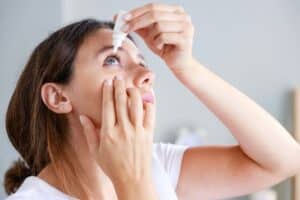Dry eye, also known as keratitis sicca or keratoconjunctivitis sicca, is caused by insufficient and/or poor-quality tears.
Table of Contents
What Is Dry Eye?
Dry eye is a disease that affects the layers of tears that cover your cornea. Your eyes have three layers of tears that cover and protect the surface of your eyes. These layers need to be stable and smooth to see clearly. When they are damaged, your eyes may not produce enough tears, or you produce a lot of tears but they quickly evaporate—causing dry eye.
Dry Eye Symptoms

Symptoms that are common with dry eye disease include:
- Blurry vision
- Sensitivity to light
- Mucus coming out of your eye(s)
- Burning, stinging, and watery eyes
- Feeling like there’s sand in your eye(s)
- Discomfort when reading or looking at a screen for long periods
Causes of Dry Eye Disease
Dry eye disease can affect patients for multiple reasons, such as the natural aging process, a side effect of antihistamines, and diseases like Sjorgren’s syndrome and rheumatoid arthritis. Dry eye is when your tear-flow system is out of balance, so your heater or air conditioning could be why your eyes are dry. Try adjusting your environment if you feel like you’re suffering from dry eye, but you’re not sure why. You can use a humidifier to help add moisture to the air or change the settings on the airflow and temperature in your home. Other main causes of dry eye are:
Allergies
People with allergies often can experience dry eye because an allergic reaction causes inflammation in the eye(s). This could reduce or increase tear production, ultimately leaving eyes dry, burning, and itchy. Additionally, taking antihistamines for your allergies may not help, as that medication can make dry eye worse.
Medications and Medical Conditions
Some people may experience dry eye due to pre-existing medical conditions, or it’s a side effect of the medication they’re on. There are different neurological conditions, eye conditions, autoimmune conditions, and endocrine conditions that can increase your risk of dry eye. Medications that can cause dry eye as a side effect are:
- Tranquilizers
- Certain Heart Medications
- Diuretics
- Birth Control Pills
- Ulcer Medications
Surgeries
Certain surgeries or procedures, such as LASIK eye surgery or cataract and cornea surgeries, may cause dry eye.
Contact Lenses
Prolonged use of contact lenses will dry out your eyes because the layers of your eye need oxygen flow. Without it, it’s difficult for your eyes to produce natural tears.
Types of Dry Eye Disease
The different types of dry eye disease include:
- Aqueous deficient dry eye
- Evaporative dry eye
- Mixed dry eye
- Meibomian Gland Dysfunction

Dry Eye Treatments
Treatment for dry eye disease can vary, ask your eye doctor which one is right for you. Some treatment options that Cleveland Eye Clinic offers are:
Eye Drops
Sometimes the over-the-counter eye drops may not be the answer. There are also effective prescription eyedrops such as Restasis and Xiidra that your doctor can recommend.
TearCare Treatment
TearCare is an in-office procedure that takes about an hour. The procedure is administered by an optometrist or ophthalmologist and his or her clinical team. The procedure is typically effective for people who have Meibomian Gland Disorder (MGD).
LipiFlow Treatment
LipiFlow Thermal Pulsation is a treatment that is typically effective for patients suffering from Meibomian Gland Disorder (MGD).,
Punctal Occlusion
The duct that drains tears from your eyes is called the punctum. A temporal punctal occlusion is when a doctor closes the punctum with a plug that’s designed to dissolve over time.
Testosterone Cream
Sometimes dry eye can be treated with testosterone cream to help the oil glands in your eyes function better.
Treat Dry Eye at Cleveland Eye Clinic
If you believe you’re experiencing dry eye or symptoms related to it, talk to Thomas Chester, OD at the Brecksville Cleveland Eye Clinic Office who is our eye care specialist about what treatment options are best for you.








